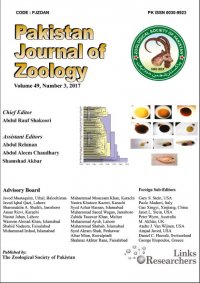1Department of Pathology, University of Veterinary and Animal Sciences, Lahore
2Department of Microbiology, University of Veterinary and Animal Sciences, Lahore
3Department of Pathobiology, PMAS Arid Agriculture University, Rawalpindi
4University College of Veterinary and Animal Sciences, The Islamia University of Bahawalpur, Bahawalpur
* Corresponding author: vet.luqman@gmail.com
ABSTRACT
Aflatoxin B1 imparts serious public health hazards by effecting 25% of world’s food crops. To get optimum production performance from livestock and poultry, proper detoxification of AFB1 in feed is mandatory. This study was designed to analyze the biological detoxification potential of Saccharomyces cerevisiae (SC) in experimental quails fed with AFB1 added diets. For this purpose 180 quails, divided in 3 groups were reared and fed with 3 different experimental diets having 0.5 mg/kg of AFB1 contamination and varying levels of SC (0.5, 1 and 2 mg/kg of feed). Another 120 birds were divided into two groups, one group was fed with basal diet (control group) and other was fed with AFB1 diet without any detoxifying agent. Growth parameters (body weight gain, feed intake, and feed conversion ratio), hematology (hemoglobin, haematocrit, erythrocyte sedimentation rate, and total leukocyte count) and immune response were recorded and analyzed by duncan test for 6 weeks. Results showed significant reduction in the deleterious effects of AFB1 in each of the tested parameters during the course of the study. During 5th week, all the tested parameters had non-significant differences with the control group and were brought back to normal due to detoxification action of SC in experimental quails. This study reports the success of SC as biological detoxification agent for the quails, an emerging protein source in developing countries.
To share on other social networks, click on any
share button. What are these?










